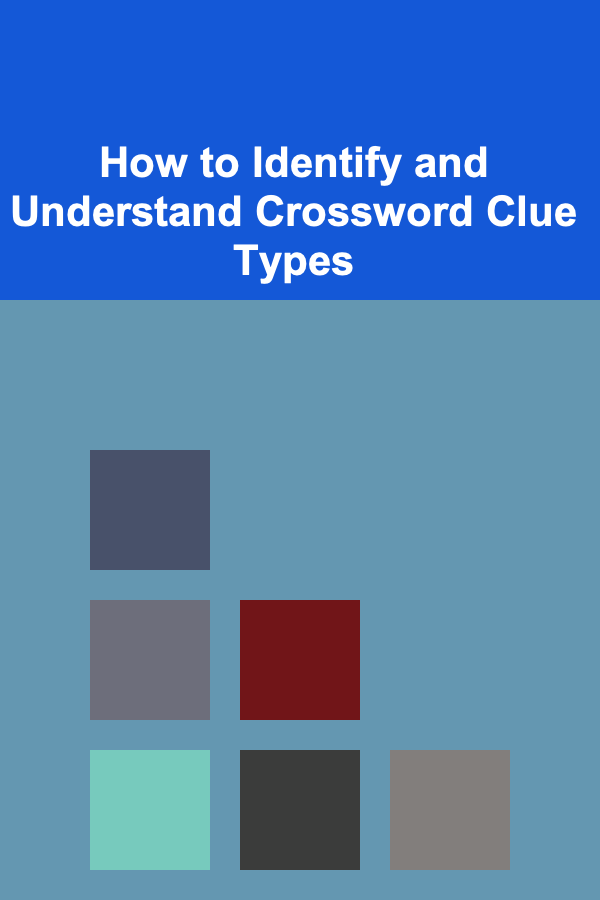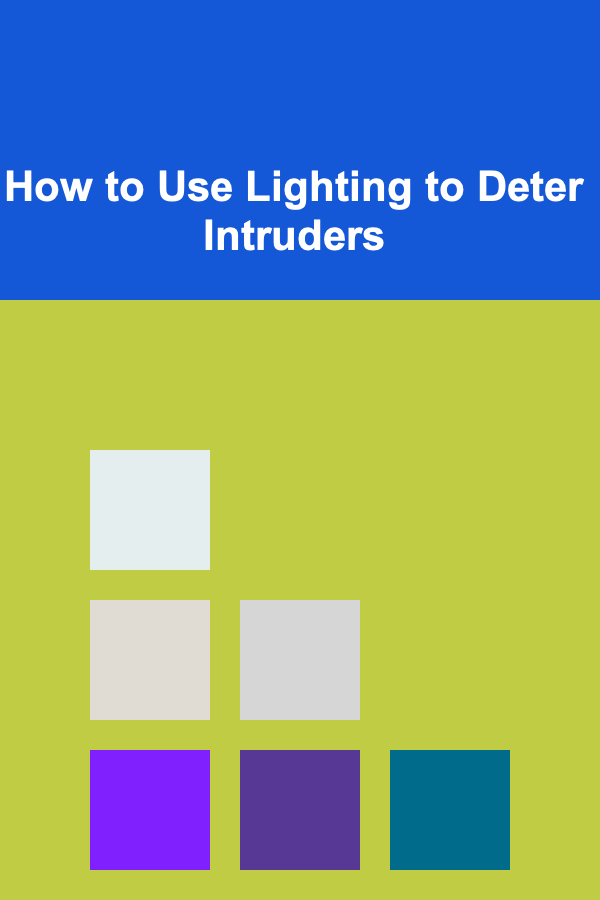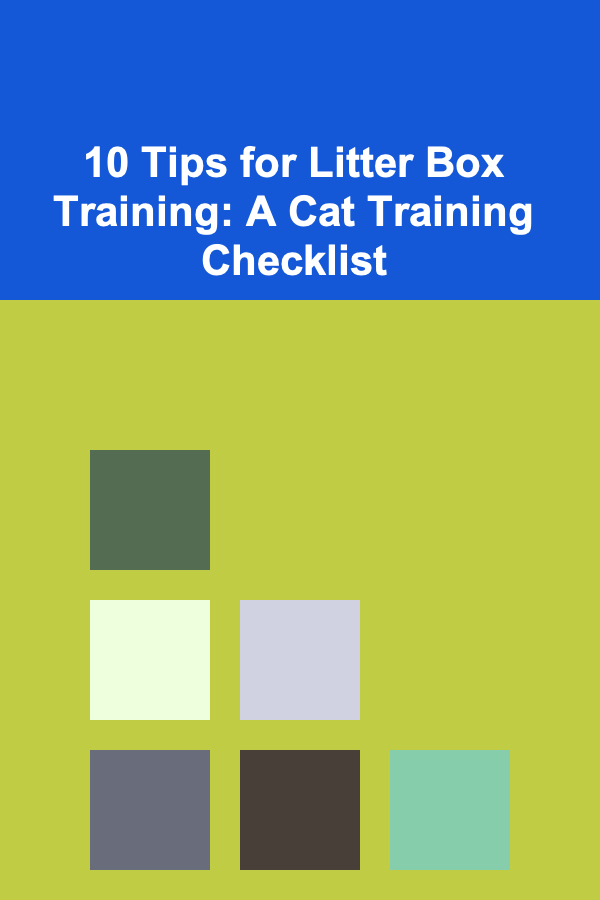
How to Identify and Understand Crossword Clue Types
ebook include PDF & Audio bundle (Micro Guide)
$12.99$11.99
Limited Time Offer! Order within the next:

Crossword puzzles are a great way to keep your mind sharp, but they can also be a source of frustration for many solvers. The key to solving crossword clues efficiently lies in recognizing and understanding the different types of clues that can appear in puzzles. In this article, we'll explore the most common types of crossword clues and give you the tools to identify and solve them.
Definition Clues
What are Definition Clues?
Definition clues are the most straightforward type of clue. They provide a direct description or definition of the answer. In fact, the answer is usually synonymous with the clue. These types of clues are often at the beginning or the end of the clue.
Example:
Clue : _"Large bird" (4)
Answer**: "Eagle"
In this example, the clue is simply describing a "large bird," and "eagle" fits both the description and the letter count.
How to Solve Definition Clues?
To solve definition clues, you need to think of synonyms and closely related words that fit both the clue's description and the grid's letter count. It's essential to take your time and consider various options, but keep in mind that crossword answers are rarely overly complicated for definition clues.
Wordplay Clues
What are Wordplay Clues?
Wordplay clues, as the name suggests, require you to engage in some form of word manipulation or lateral thinking. These clues are more cryptic than definition clues, and solving them often involves rearranging, abbreviating, or interpreting the clue in a non-literal way.
Types of Wordplay Clues:
a. Anagram Clues
Anagram clues require you to rearrange letters to form the answer. Often, the clue will contain a word or phrase like "scrambled," "mixed," "jumbled," or "in disarray" that signals an anagram.
Example : Clue : _"Grilled meat scrambled" (5)
Answer : "Steak"
The word "scrambled" indicates an anagram of "steak," and it fits the description of a "grilled meat."
b. Homophone Clues
Homophone clues rely on words that sound the same but are spelled differently. A homophone clue might include the word "sound," "heard," "say," or "audio."
Example : Clue : _"Bear's sound" (3)
Answer : "Bee"
The answer "bee" sounds like "B" (the sound of a bear), playing on the homophone relationship.
c. Hidden Word Clues
Hidden word clues involve finding the answer hidden within a longer string of letters in the clue. Words like "part of," "hidden in," or "within" often indicate these types of clues.
Example : Clue : _"Part of question mark" (5)
Answer : "Quest"
The word "quest" is hidden within "question."
d. Charade Clues
Charade clues combine parts of words or abbreviations that must be pieced together to form the answer. The clue typically hints at the components of the answer in a sequence.
Example : Clue : _"Large + animal" (3, 4)
Answer : "Big cat"
In this case, the answer is a straightforward combination of the word "big" (large) and "cat" (animal).
Cryptic Clues
What are Cryptic Clues?
Cryptic clues are more complex than standard wordplay clues and often involve multiple layers of wordplay. They are typically made up of a definition part and a wordplay part, and the answer is hidden in some form within the clue.
Types of Cryptic Clues:
a. Double Definition Clues
In double definition clues, the clue provides two definitions that can both describe the answer. These definitions are often unrelated but must be interpreted together to find the solution.
Example : Clue : _"Fast time" (3)
Answer : "Run"
Both "fast" (as in moving quickly) and "time" (as in a race or run) can be associated with the word "run."
b. Reversal Clues
Reversal clues involve finding a word that means the same as part of the clue but in reverse order. Words like "back," "reversed," "turned," or "up" signal a reversal clue.
Example : Clue : _"Backstage with an actor (4)
Answer : "Star"
The word "star" is the reversal of "rats," referring to actors as stars and the reversal of "rats" being "star."
c. Container Clues
Container clues are puzzles where one word or letter is placed inside another word or phrase. Clues will typically use words like "around," "within," or "contains."
Example : Clue : _"Book surrounding river (5)
Answer : "Novel"
In this case, the answer is "novel," where the abbreviation for "river" (R) is inside the word for "book" (novel).
Abbreviation Clues
What are Abbreviation Clues?
Abbreviation clues contain shortened versions of words that can be tricky for solvers who are unfamiliar with the abbreviations commonly used in crosswords.
How to Solve Abbreviation Clues?
Abbreviation clues require knowledge of standard abbreviations for places, professions, common terms, or even names. Some examples of abbreviations commonly used in crossword puzzles include:
- Dr for "doctor"
- PC for "police constable"
- Ft for "foot"
- NYC for "New York City"
Understanding these abbreviations can help you quickly identify and solve these types of clues.
Subject-Specific Clues
What are Subject-Specific Clues?
Subject-specific clues are clues that relate to specific fields, such as literature, geography, science, and history. These clues require you to have knowledge of a particular subject or discipline to solve them. Subject-specific clues often appear in puzzles created for advanced solvers or themed puzzles.
How to Solve Subject-Specific Clues?
To solve subject-specific clues, you must be familiar with the relevant subject matter. For example, a clue might ask for a famous French writer (such as "Famous French Writer of Les Misérables"), and the answer would be "Hugo."
If you're stuck on a subject-specific clue, try thinking about the broader context of the puzzle. If it's a themed puzzle, the answers may relate to a particular category (e.g., historical events, literature, or geography).
Cryptic Definition Clues
What are Cryptic Definition Clues?
Cryptic definition clues are less direct and involve wordplay that leads to an unusual or indirect definition of the answer. These clues often require lateral thinking and a creative approach to solving them.
Example : Clue : _"The king of the jungle, one with a golden mane" (3)
Answer : "Lion"
The clue uses metaphorical language ("king of the jungle") and a physical feature ("golden mane") to define a "lion."
Thematic Clues
What are Thematic Clues?
Thematic clues refer to a theme that runs through an entire crossword puzzle. These types of clues will generally appear in puzzles that follow a specific theme, such as famous musicians, historical figures, or a geographical region.
How to Solve Thematic Clues?
The key to solving thematic clues is understanding the overall theme of the puzzle. Once you know the theme, it's easier to guess answers that fit within that context. Keep an eye on any repeated patterns, and remember that the answers will often be related to one another in some meaningful way.
Final Thoughts on Solving Crossword Clues
Crossword puzzles are a fun and challenging way to engage with language, wordplay, and problem-solving. By recognizing the various clue types and understanding the strategies to solve them, you can improve your ability to tackle any puzzle that comes your way.
Each crossword puzzle is an opportunity to test your skills and expand your vocabulary, so take your time, approach each clue with patience, and enjoy the journey to the solution. Whether you're a beginner or a seasoned solver, the satisfaction of completing a crossword puzzle is well worth the effort.
Reading More From Our Other Websites
- [Home Holiday Decoration 101] How to Bring the Outdoors Inside with Holiday Decorations
- [Personal Investment 101] How to Avoid Common Investment Mistakes and Protect Your Assets
- [Home Rental Property 101] How to Prepare Your Rental Property for Winter
- [Star Gazing Tip 101] From Constellations to Canvas: Artistic Inspiration Under the Stars
- [Home Family Activity 101] How to Make Family Road Trips More Enjoyable with Fun Games
- [Personal Finance Management 101] How to Plan for Holiday Spending Without Going Into Debt
- [Organization Tip 101] Why Having a Home Inventory is Essential
- [Biking 101] The Pros and Cons of Different Bike Locks: A Comprehensive Comparison
- [Personal Financial Planning 101] How to Pay Off Credit Card Debt: Strategies for Becoming Debt-Free
- [Home Storage Solution 101] How to Store Your Sports Equipment in an Organized and Accessible Way

How to Incorporate Blue Light Protection into Skincare
Read More
How to Use Lighting to Deter Intruders
Read More
The Ultimate Guide to Secondhand Shopping: Tips for Scoring the Best Deals
Read More
How to Build a Profitable Coaching Business
Read More
How to Buy Your First Stock
Read More
10 Tips for Litter Box Training: A Cat Training Checklist
Read MoreOther Products

How to Incorporate Blue Light Protection into Skincare
Read More
How to Use Lighting to Deter Intruders
Read More
The Ultimate Guide to Secondhand Shopping: Tips for Scoring the Best Deals
Read More
How to Build a Profitable Coaching Business
Read More
How to Buy Your First Stock
Read More